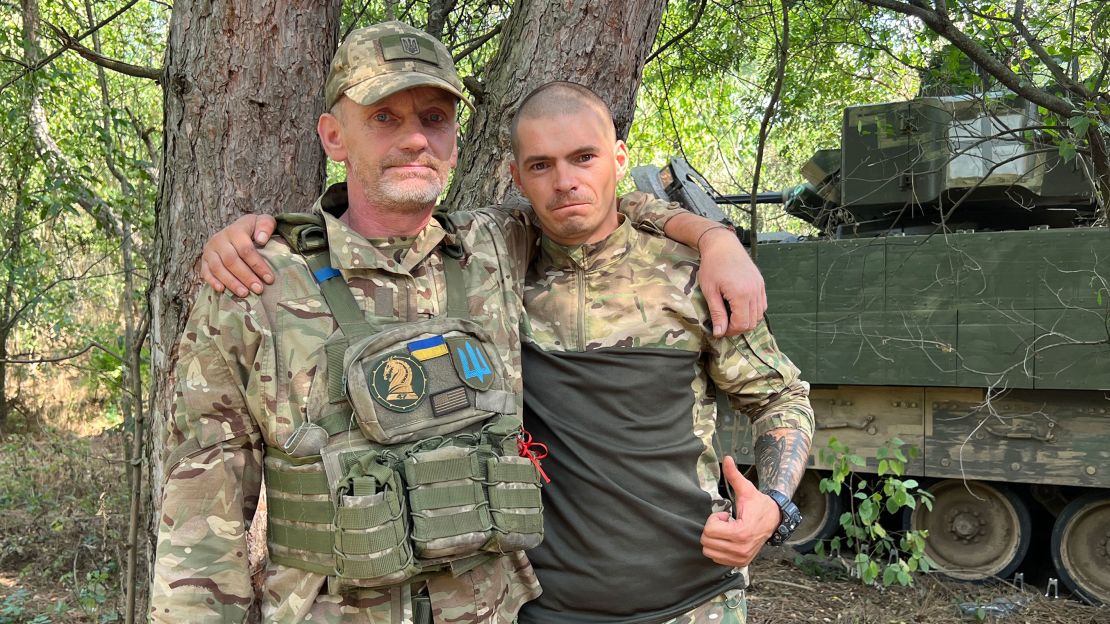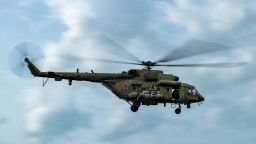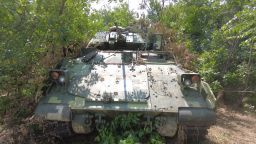The T0408 was once a country lane that led peacefully southward through the open fields of Ukraine’s southern Zaporizhzhia region, from Orikhiv through Robotyne and on to Tokmak.
Now, the men of Ukraine’s 47th Mechanized Brigade have renamed it “the road to hell” and the picture they paint is apocalyptic: the sky “black with drones,” constant artillery and aerial bombardments and the once-fertile fields crammed with Russian mines, trenches and dugouts that make any southward progress virtually impossible.
Yet southward progress is precisely what the Ukrainian soldiers with the call signs Karatsupa, Pan and Taba seek, driving their American-made Bradley Fighting Vehicles down a road that is also, they believe, the road to Ukrainian victory.
Every day, under relentless fire, they drive fresh troops in and spent ones out, with just 30 seconds to make the swap on the battlefield.
“I’ve been serving since 2014 and I’ve never encountered such minefields anywhere. Just hectares of them, to the left and to the right,” said Karatsupa. “A lot of trenches, dugouts. And all this for dozens of kilometers. They even throw mines at the territory we are taking. Without the mines, we would already be in Tokmak.”
Much has been made of the strategic importance of Robotyne for Ukraine’s three-month-long southern counteroffensive. But its capture has enraged the Russians further, say the men of the 47th Brigade.
The remains of what was a village of 500 before the war continue to be pounded day and night. Not just by artillery and aerial bombardments, but most fiercely by drones.
“The sky is black with them,” said Pan. Surveillance drones, attack drones, some Ukrainian, some Russian – it is, he said, impossible to tell. The worst are kamikaze drones that will follow you and obliterate you, he explained.
And, after a month of fighting, there was so little left of the village they took in late August that they couldn’t believe what they found: civilians still cowering in their basements.
After the infantry told them to gather their things, they were rushed into the Bradleys under constant fire. One woman brought her cat, another civilian asked if he could bring the car he’d spent his life savings on before the war by driving it out sandwiched between two Bradleys.
“Things in the occupied territories are different,” said Pan, explaining that the vehicle was an old $300 Zhiguli but that “belongings there take on a different meaning.” After some negotiation, the car was left behind as the evacuation got underway.

“The Russians immediately started shelling us,” said Karatsupa. “It doesn’t matter to them who is there – military or civilians. They don’t care. As we closed the Bradley’s ramp, the artillery barrage began immediately. Luckily the vehicle is good and we drove away. We reached the next turn and the Russians opened fire on us again, even though they knew we were carrying civilians.”
CNN is unable to independently confirm that the Russians were aware the vehicle was transporting civilians.
In a forest nearby, the Ukrainian troops unloaded the mostly elderly men and women, starved and filthy after a month spent underground, during the worst of the fighting.
“They told us that the Russians had treated them like slaves,” said Karatsupa. “They had to steal from the Russians in order to have something to eat.”
But even before the counteroffensive and the month-long battle for the village itself, their lives, he said, had been made unbearable by a Russian occupation none of them had the means to flee.
Like so many villages and towns in the Zaporizhzhia region, Robotyne was cursed from the very start of the full-scale war by its geography, finding itself just south of where the Russian invasion stalled in March 2022 and therefore beyond the reach of any help.
“They forced them to do various jobs, did not let them out of their homes,” Karatsupa said of the civilians. “They were treated like servants. And these people had nowhere to go. They did not want to go to Russia, but they could not get to Ukraine. They stayed, endured, worried. They were very happy when we arrived, when they realized that the Armed Forces of Ukraine had come to the village.”
But without the Bradleys, say the men, no one would have survived. They proudly showed CNN some of the direct artillery hits the US-made armored vehicles had taken, singing their praises repeatedly
Their only disadvantage, says Karatsupa, is their distinctive whistling sound, which can be heard from miles away. This does have a plus side in instilling fear into the Russians, he added, and in reassuring frontline Ukrainian infantry, who know fire cover is on its way. But no vehicle, however remarkable, is ever entirely impregnable.
And Karatsupa, Pan and Taba now carry with them not only pride at what they’ve achieved but also grief at what they’ve lost.
Some of the men with whom they captured Robotyne last week have since been killed in a direct hit on their Bradley. A reminder that however important the gain of Robotyne is to the counteroffensive, there is far more loss ahead, further down the road to hell.







